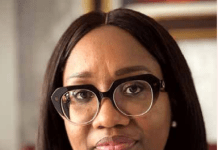
Prof. Oluwabukola Oladunni Salami is the newly elected vice-president of the Canadian Nurses Association (CNA). In this exclusive interview with Ola Aboderin, the distinguished professor of Nursing, who is currently with the Department of Community Health Sciences, Cumming School of Medicine, University of Calgary, Canada, outlines her vision for CNA, while also reminiscing on her background and the highlights of her career journey, so far. Salami, who is also the lead for Equity, Diversity, and Inclusion at the Alberta Children’s Hospital Research Institute, equally examines pertinent issues affecting Nursing and healthcare globally – with particular emphasis on Nigeria – proffering recommendations for progress, as well as advice to younger nurses. Excerpts:
Congratulations on your recent election as vice-president of the Canadian Nurses Association. What prompted you to vie for the position and what vision do you have for the association?
I am involved in quite a number of activities in the nursing profession, but I also do not believe in being a passive observer. My motivation for pursuing the position are of several folds. First, I see the great potential of nurses and national nursing organisations to advance and drive forward an equity agenda at local, national and international levels.
Second, I have been thinking lately about the global transformations in healthcare and the potential for Nursing and nurses to take a leadership role in contributing positively to local and global transformations. My vision is to work together with Canadian nurses and relevant stakeholders to position the Canadian Nurses Association as a global leader and voice in advancing equity and contributing positively to global and local transformations.
I also have a firm commitment to drive forward the CNA vision – “progressive leadership that unites nurses to advance our profession, the health of Canadians, and a healthier environment and society.”
Tell us about your family background and academic journey.
I was born in Akure, Ondo State, Nigeria. My father is from Efon Alaaye, Ekiti, and my mum is from Ijero Ekiti. I went to Bishop Hughes Memorial Nursery and Primary School in Akure and then Command Secondary School, Kaduna, and St. Matthias High School, Akure. I migrated to Canada at the age of 16 and completed high school at Rosedale Heights Secondary School, in Toronto, and Mother Teresa Catholic High School, in Scarborough, Ontario. So, I went to four different high schools in two countries.
During my first year in Canada, I completed a Summer Mentorship Programme for black youth at the University of Toronto. I then completed my Bachelor of Science in Nursing, with a minor in Psychology, at the University of Windsor. I also obtained my Master of Nursing, with a focus on Nursing Administration, from the University of Toronto; and my PhD in Nursing from the University of Toronto.
What motivated you to study Nursing?
My initial career goal was to become a physician. In 1998, I completed the Summer Mentorship Programme at the University of Toronto. I was in the health sciences stream at that time and a heavy focus was on mentoring black youth to become physicians.
During the experience, I had the opportunity to shadow several doctors (including an obstetrician, a paediatrician, and a family physician). I also had experience shadowing a nurse practitioner at a clinic, which gave me a better perspective of what nurses do. I appreciated the relationship the nurse had with the families for whom she cared. This inspired me to consider Nursing.
I initially applied for admission to complete a degree in Neuroscience to prepare me for entry to medical school, as a three- or four-year undergraduate degree is required for entry into medical school in Canada. I was offered admission to complete a neuroscience degree but decided to change to a nursing degree for several reasons.
First, I thought Nursing would be a good professional path, as it would prepare me for medical school; and, if I did not get into medical school, it would be a profession in which I could choose to continue working, based on my past experience with the nurse practitioner.
Tell us about your career path since graduation from nursing school to date.
My career path to date has been fulfilling. As mentioned earlier, I completed a Bachelor of Science in Nursing (with a minor in Psychology) from the University of Windsor, with honours, in 2004. I worked as a nursing student at a summer camp, while waiting to receive my licence. I began working as a paediatric oncology nurse at the Hospital for Sick Children in Toronto, in September 2004.
I began my Master of Nursing (with an Administration focus) at the University of Toronto in January 2006, while continuing to work full-time as a registered nurse. I completed my master’s degree in December 2007 and worked as a public health nurse for Toronto Public Health, from January to June/July 2008, while continuing to work part time at the Hospital for Sick Children.
I began my PhD in Nursing in September 2008 at the University of Toronto, under the supervision of the dean of Nursing at the time (subsequently vice provost), and completed it in December 2013. During the programme, I worked as an interprofessional nurse educator on immigrant child health at the Hospital for Sick Children, a lecturer at Trent University, a course instructor at Ontario Tech University, and a teaching assistant and lecturer at the University of Toronto. I also worked part-time as an examiner for internationally educated nurses.
I received a job offer to begin working as an assistant professor of Nursing, 10 months before completing my PhD, and started in this role at the University of Alberta in January 2014. My early research focused on the links between immigration policy and health policies and practices. I applied for early tenure and became an associate professor in 2018. I also took a maternity leave of just over one year in 2018.
I applied for early promotion and became a full professor, in the Faculty of Nursing, University of Alberta, in 2022. From September 2022 to March 2023, I was the director of the Intersections of Gender Signature Area in the office of the vice-president, Research and Innovation, at the University of Alberta. Two weeks after taking the position, I was informed that our funding from the vice-president would cease and I either had to end the signature area or transition to an institute. I led the transition of the signature area to the Institute for Intersectional Studies.
In July 2023, I received offers to become a full professor in the Faculties of Nursing and Medicine at four universities in Canada and chose the University of Calgary. I am currently full professor at the Department of Community Health Sciences, Cumming School of Medicine, University of Calgary and also the lead for Equity, Diversity, and Inclusion at the Alberta Children’s Hospital Research Institute.
Over the past 10 years, I have been on several boards, including the Intergovernmental Scientific Committee on Global Health to the Government of Canada; Social Sciences and Humanities Research Council of Canada Board/Council; Canadian Institutes of Health Research – Institute of Human Development, Child and Youth; Canadian Medical Association Journal; Canadian Journal of Nursing Research; Canadian Nurses Association; Black Opportunity Fund; Africa Centre, Black Health Alliance; Alberta College of Social Workers; and Black Physicians’ Association of Alberta.
I have also received several awards, including the Sigma Theta Tau International Nurse Researcher Hall of Fame, American Academy of Nursing, Canadian Academy of Nursing, and Diversity and Equity in Research Award from the Health Research Foundation.
In your experience, what are the most pressing global health challenges, and how can the nursing profession play a pivotal role in addressing them?
Rather than global health challenges, I would rather focus on global challenges and transformations. The main global challenges and transformations currently are technology; climate change; security; pluralism, ethnic and race relations; and pandemics. While many of these are present challenges, some provide opportunities for innovation and cutting-edge transformation.
Many of these challenges also require harnessing the power of innovation. I believe what breeds innovation is when two disciplines that have never come together talk to each other to explore possibilities. For example, imagine what opportunities we may unravel if nurses collaborate with engineers, archaeologists, or the business sector to generate ideas. This is where true innovation lies and where we may be able to harness the art and science of Nursing.
Are there specific strategies you employ to bridge the gap between your research findings and their practical implementation in healthcare settings?
Before I begin any study, I ask myself why it needs to be conducted. This is one way to decolonise the research process. It is important for a researcher to be reflexive about their motivation for conducting research. Another issue of central importance is the extent to which you have engaged stakeholders. My research has been largely impactful based on my engagement with communities and stakeholders throughout the research process. Research findings need to be disseminated widely, and not just in academic publications. Providing findings in digestible formats to diverse stakeholders including decision makers, communities, and policy makers is also important.
From your interactions and experience, what is your assessment of nursing practice in Nigeria and what are your recommendations to advance the profession to global standards?
I believe several opportunities exist to advance nursing practice and policy. In Nigeria, Nursing is often not respected and nurses are often not seen as knowledgeable. For instance, I have heard nurses cannot lead hospitals in Nigeria. This is not the case in Canada where nurses lead several hospitals.
I believe one constraint we currently face in Nigeria is that our power and potential is confined within Nursing and we do not think about interprofessional leadership, including opportunities outside of healthcare. Nurses need to be able to engage in interprofessional dialogue and position themselves as leaders in interprofessional teams. We need professional development opportunities for nursing leaders and nurse educators in Nigeria that expand their horizons and skills.
How have you been engaging and impacting the nursing community in Nigeria with your expertise, initiatives and findings?
I have mentored some nurse leaders and educators in Nigeria in areas including nursing leadership, and have spoken at some conferences.
What advice would you give to younger or aspiring nurses who want to be similarly outstanding and make transnational impact?
My advice is as follows: One, develop yourself as a leader, not just within nursing but across all professions. Be sure you have the strong theoretical expertise to dialogue with someone in the social sciences and the expertise to dialogue with someone in the health sciences. Two, engage interprofessionally and dialogue with people interprofessionally. Three, volunteer and engage in your professional organisations. Four, join international organisations such as Sigma Theta Tau, if you are eligible, and become active – don’t just join. Five, work on improving your writing and publication skills. And, six, ensure you work with the utmost level of integrity and strive for excellence in all you do.










